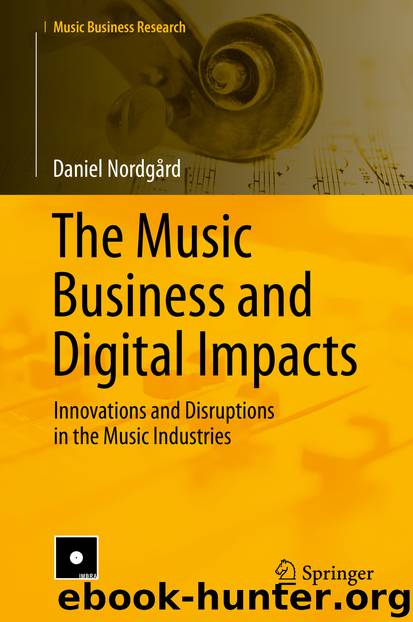The Music Business and Digital Impacts by Daniel Nordgård

Author:Daniel Nordgård
Language: eng
Format: epub
ISBN: 9783319918877
Publisher: Springer International Publishing
The above statement relates to a general concern that those involved in deciding which actions to take and which paths to choose are unwilling or incapable of looking beyond the old hegemony. It also relates to concerns that new models are fundamentally different than the old models, and so proponents of the old models might not be the right ones to assess them.
As another delegate put it: “We need to build new, web-native-revenue streams. Revenue streams that are only possible because of the Internet.”
The development and implementation of such new revenue streams rest on an ability to look beyond the old models of matching demand with supply, to rely on very different economic models than those of the past. Initially, these models are almost entirely predicated on ad-based templates and concepts of “feels like free”. However, when forecasts derived from potential revenue sources were suggested, there was a great deal of doubt as to whether these forecasts would actually morph into sustainable, lasting models for the future of the music industries, reflected in a conversation during the 2007 Conference, in which the sale of LastFm.com for almost $300 million was used as proof of the economic potential of ad-based models. The statement led to strong objections and scepticism:(Music industry analyst): I think there is a huge problem, which is that we are not talking about data or facts the way we are when we are searching on Google. We are talking about cultural consumption and fans that by definition are fanatical about their artists and not about this other stuff that may or may not happen to fit their profile of interests. So, the problem we’ve got is with referring to Last.fm as a successful company. Last.fm is not a successful company! Last.fm is a company that is seen as a strategic opportunity for CBS. It doesn’t mean it’s a successful company at all! Actually, it hardly has any revenues. That’s not a successful company. So, what we have to be clear about is that when we look at these potential models we have to understand that we still don’t have proof. We still haven’t, after 10 years of doing this, actually got the models that justify and clarify that. And particularly the advertising. So, the theory is fine, but what I’m saying is that it’s still only theory.
Q7, (Roundtable, 2007)
Download
This site does not store any files on its server. We only index and link to content provided by other sites. Please contact the content providers to delete copyright contents if any and email us, we'll remove relevant links or contents immediately.
The Goal (Off-Campus #4) by Elle Kennedy(13672)
Kathy Andrews Collection by Kathy Andrews(11830)
Diary of a Player by Brad Paisley(7574)
Assassin’s Fate by Robin Hobb(6216)
What Does This Button Do? by Bruce Dickinson(6207)
Big Little Lies by Liane Moriarty(5804)
Altered Sensations by David Pantalony(5103)
Pale Blue Dot by Carl Sagan(5007)
Sticky Fingers by Joe Hagan(4197)
The Death of the Heart by Elizabeth Bowen(3619)
The Heroin Diaries by Nikki Sixx(3548)
Confessions of a Video Vixen by Karrine Steffans(3308)
Beneath These Shadows by Meghan March(3307)
How Music Works by David Byrne(3268)
The Help by Kathryn Stockett(3146)
Jam by Jam (epub)(3089)
Harry Potter 4 - Harry Potter and The Goblet of Fire by J.K.Rowling(3073)
Computational Linguistics and Intelligent Text Processing: 20th International Conference, CICLing 2019 La Rochelle, France, April 7â13, 2019 Revised Selected Papers, Part I by Alexander Gelbukh(2995)
Strange Fascination: David Bowie: The Definitive Story by David Buckley(2872)
